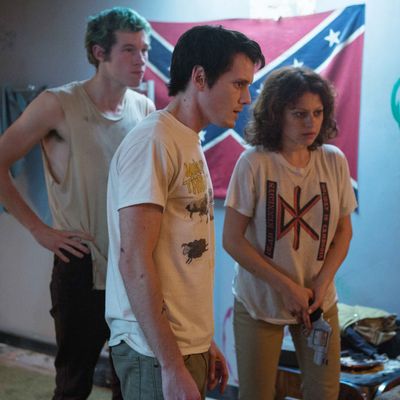
The thriller Green Room buzzes in on a wave of buzzy buzz that began at last year’s Cannes Film Festival, along the lines of: Omigod, it’s so intense, it’s so brutal. And yeah, it’s intense. It’s brutal. The villains are a higher grade of white trash than in writer-director Jeremy Saulnier’s first film, Blue Ruin, and a lot of people we care about die in horrible ways. But for all its artiness and Grade-A acting, it’s Grade-B siege-movie schlock — less scary than aggressively unpleasant, like a shrill hardcore-punk group.
The protagonists are, in fact, 20-something members of a shrill hardcore-punk group — not bad, but out of cash and forced to siphon other peoples’ gas on a Pacific Northwest tour. They think they’re lucky when they’re booked into what turns out to be a white-supremacist skinhead venue, and they test that luck by opening their set with the Dead Kennedys’ Nazi Punks Fuck Off. It’s a witty idea to have two strains of punk culture butting heads, and the movie would have been more fun if it was that song that started the ball rolling toward the group’s imprisonment and the subsequent carnage. But what happens next is a C-movie trope: One guy forgets his phone and opens a door he shouldn’t open and sees something he shouldn’t see. So the skinheads can’t let them go.
Once our protagonists get locked in a makeshift prison, Saulnier goes for a jangly, oppressive texture. The shots are short and sharp and at angles that exacerbate the claustrophobia. The dim, greenish lighting keeps you leaning forward and squinting, although you dread what you’ll actually see — i.e., dogs ripping people to pieces. Saulnier goes in tight on the violence but doesn’t linger: Thanks for small mercies.
The amiable Anton Yelchin gets first billing and looks like a goner after a gruesome injury at the midpoint, but he holds on longer than you’d think. The other ingénue type is the doe-eyed Imogen Poots. She plays a girl in the supremacist gang who joined out of desperation — she wanted to belong to a family — but hadn’t bargained on homicide and is now on the wrong side of the door. But the only character I really, really wanted to survive was the blunt, nervy punkette of Alia Shawkat. I kept my fingers crossed until the very end.
What lifts Green Room briefly out of its class is the chief villain, Darcy Banker, the leader of the supremacist compound, played by Patrick Stewart. Those of us who’ve followed Stewart over the decades — as Jean-Luc Picard, Professor Xavier, on Broadway as Macbeth and Prospero — know how ringingly the man can declaim. Whatever he does, he brings a bit of the Royal Shakespeare Company with him. But not here.
Stewart’s smooth face is partly hidden under a beard and behind glasses. His voice is low and hoarse and his tone often fatherly. His Darcy Banker is, above all, a pragmatist. “We’re a movement, not a party,” he reminds his maniacal acolytes. What’s most important to him is that our protagonists die in a way that can be made to seem accidental — which gives them an advantage, even if they’re not aware of it. I was never sure what Banker is actually preaching or why he owns this particular grotty concert venue if he doesn’t want to run afoul of the police. But Stewart can both give you chills and make you understand why it would be cool to be a member of his crew.


